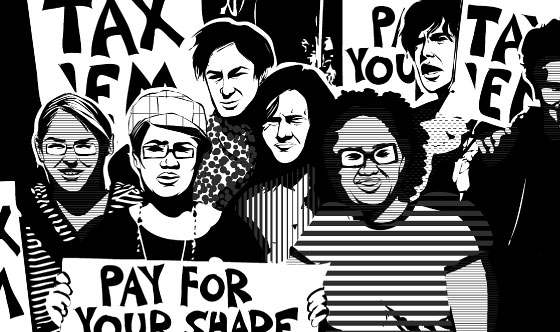
What happened to the rich and powerful’s power? While the federal government debates Barack Obama’s proposals to milk the well-to-do, New York is poised to approve a substantial personal-income-tax hike for people making more than $500,000. New York’s business elites are now wondering how they lost out. They helped get Governor Pataki elected through a disciplined anti-tax campaign, which coincided with a national consensus that raising them was political suicide.
The change of tone happened in Washington first. Obama was never shy about his plan to raise taxes on households and businesses earning more than $250,000 a year—which John McCain called a socialist “redistribution of the wealth.” Yet Obama fared better among the most affluent voters—52 percent of those making more than $200,000 voted for him—than he did among those making between $50,000 and $200,000. Obama’s promise to “govern for all the people, not just the interests of the wealthy and well-connected” came across more Andrew Jackson (“the rich and powerful too often bend the acts of government to their selfish purposes”) than Karl Marx.
“It’s not an easy time to defend the rich,” says Kathryn Wylde, head of the Partnership for New York City. “In the current environment, with the anti–Wall Street sentiment, it’s just politically unattractive.”
Dan Cantor, who runs the labor-affiliated Working Families Party, gave his own diagnosis. “We just work much harder than the right-wingers. They think they can just do it by writing checks to the politicians. We don’t have money. We have our passion.”
That’s not quite true. In Albany, the wealthiest and most well-connected groups often are representing the little guy. The teachers unions burn through $4 million a year on donations to state lawmakers and lobbying expenses, rivaling the outlays of the state’s hospital associations, which also pressed for a tax hike.
Since December, the supporters of the rich tax—an alliance of organized labor and community-activist groups—waged a campaign that further weakened Governor Paterson. They spent millions on ads attacking him and staged feisty protests. (At one near City Hall last month, 1199 SEIU president George Gresham mocked his adversaries: “Where are the wealthy going to go? Iowa?”)
Cantor says his party also banged on 72,000 doors, collecting over 12,000 “handwritten” notes calling on Albany to raise taxes.
At the last minute, real-estate and business trade groups pulled a long-dormant nonprofit group, Taxpayers for an Affordable NY, out of the mothballs. But it hasn’t done much good. The deeper problem, says Real Estate Board head Steven Spinola, is that “the business community is not as monolithic as the unions.”
The idea of a moneyed underclass isn’t a new one. Tocqueville, a contemporary of President Jackson’s, saw wealth as a “cause of disfavor and an obstacle to gaining power” in America. The rich, he wrote, “never form a body which has manners and regulations of its own,” and prefer to retreat into private life than to “engage in an often unequal struggle against the poorest of their fellow citizens.”
Spinola says the thrashing was a wake-up call. “Maybe we need to run ads about policy issues or pick individual campaigns and invest some money into those campaigns to have an impact,” he says. “We had been pretty successful up to now.”
Have good intel? Send tips to [email protected].